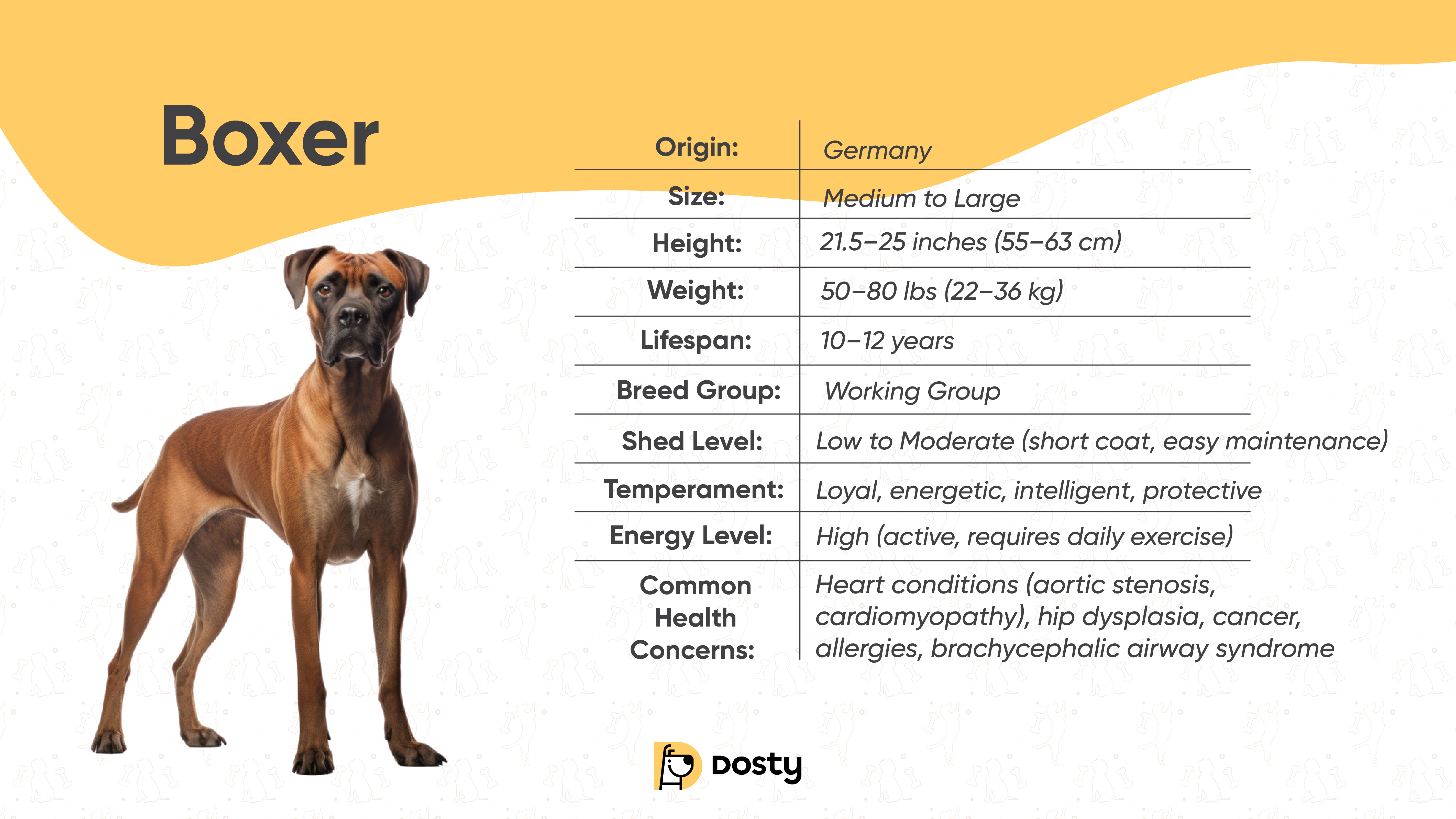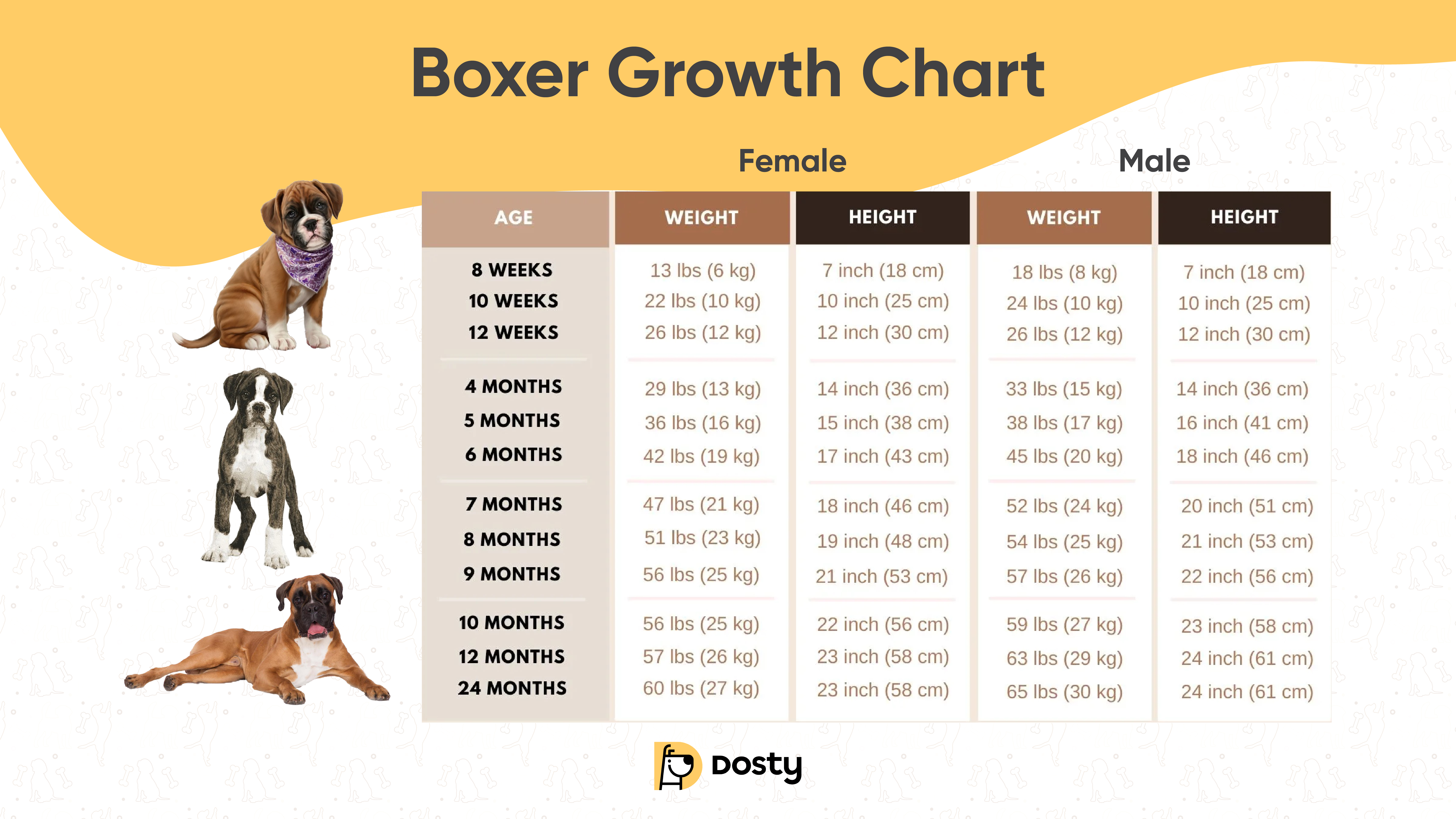On this page
About the Boxer
With origins in Germany in the late 1800s, the Boxer is a medium to large-sized working dog. To breed them, now-extinct Bullenbeisser was crossed with English Bulldogs to create a strong, agile, and intelligent dog. Boxers were originally developed for hunting, guarding, and military work, which made them sprightly guards and friends.
Once used for big-game hunting, Boxers eventually became reliable police and military dogs, thanks to their loyalty and intelligence. Gradually, their loving demeanor and playful personality beatitudes made them favored family pets around the globe.
💡 Quick Facts About Boxers

"Boxers are very loving, high-energy breeds, and they require a lot of training and exercise since the levels in these puppies are high and can lead to behavioral problems if not managed," says Dr. Lauren Thielen.
👉 A breed that is loyal and energetic with lots of character, just give them proper training and care with Dosty App to keep them happy and healthy!
What Makes Boxers Different?
Boxers are powerful, intelligent and active dogs. They were known for their athleticism, loyalty and playful personality.
They have a square-shaped head and muscular body which sets them apart from other breeds. They have a deep chest, powerful jaws, and high stamina, making them perfect working dogs. Boxers tend to be natural guardians, willing and able to protect their humans.
Unlike many big breeds, Boxers retain their youthful spirit and playful nature well into adulthood. Good with families, but require regular training to keep their excitement and energy levels in check.
“Boxers are very protective, but they are not inherently aggressive,” says Dr. Jeff Werber. With proper training and socialization, they can become confident, well-mannered companions.”
Read more insightful facts about Boxers Now!
_(3)_1741950384.webp)
How Big Do Boxers Get?
Boxers are medium to large dogs with a muscular and athletic build. Males weigh 27–32 kg, and females 25–29 kg, with males being 57–63 cm tall and females 53–60 cm tall. Keeping them at a healthy weight is important to avoid joint stress and heart issues associated with the breed.
Growth Chart for Boxers

Boxers experience rapid growth during their early life stages, and Dr. Carmen Totolici, explains, "For optimal bone development and to avoid obesity-related health problems later in life, the right nutrition and exercise are imperative during this window of time."
Monitor your Boxer's growth with the Dosty App❗
✅ Track weight & height changes to ensure proper development
✅ Get expert nutrition & exercise tips tailored for growing Boxers
✅ Set reminders for vet visits and check-ins
📲 Start tracking your Boxer’s health today with the Dosty App!
Are Boxers Good Family Dogs?
Yes, Boxers are characterized as affectionate, protective, and playful, and would tend to do well in a family setting.
They can be very good with children, being gentle and patient, although their high energy is too much for toddlers. Boxers are especially great with families and tend to be Velcro dog which means they like being as close to the owner as possible.
Due to their natural protective instincts, with proper training and socialization though, they can be wary of strangers. Yet, with early socialization, they make excellent, clandestine companions.
_(1)_1741942105.jpg)
Are Boxers Active?
Yes, Boxers are one of the most active dog breeds, and need daily exercise to remain healthy.
Best Activities for Boxers:
- Daily Walks & Runs – Boxers require at least 1–2 hours of exercise per day. Because of their stamina and speed, they make excellent jogging companions.
- Fetch & Agility Training – Fast-paced activities, such as fetch and obstacle course, help maintain their health.
- Tug-of-War & Scent Games – These types of games require their brain and muscles, helping to keep them occupied and engaged.
- Social Playtime – Boxers enjoy playing with other dogs, but they need to be (properly) socialized so as not to be rough.
While exercise keeps them moving, training keeps them well-behaved❗
Exercise is important, but Boxers require regular training to keep them focused and obedient. Joined with a lack of supervision, this could turn them with jumping up, leash pulling or rowdy play. In order to thrive, you would need to establish the right combination of exercise and training routine for your Boxer.
Whether it's teaching them to sit or mastering advanced commands, Dosty App will help you train your Boxer as a professional trainer!
✅ Before Training Matters: Instruction on name training, rewarding, tactile communication and much, much more to provide a solid foundation.
✅ Basic Commands: Work on sit, stay, recall, place, and no to have a well-behaved pooch.
✅ Positive Reinforcement: Use marker words and hand signals to strengthen the communication between you and your fur friend!
👉 Download Dosty App for quality coaching today!
_(2)_1741948202.webp)
What Should Boxers Eat?
Due to their muscular build and active lifestyle, boxers need a protein-rich diet.
Best Diet for a Boxer:
✔ Protein (30-40%) – Builds and retains muscle (chicken, beef, fish).
✔ Healthy Fats (15-20%) – Excellent for the brain, skin and coat (salmon oil, flaxseed).
✔ Complex Carbohydrates (20-30%) – Energy sources (brown rice, sweet potatoes).
✔ Taurine & Omega-3 Fatty Acids – Helps maintain heart health—a crucial factor for Boxers, which are more prone to cardiomyopathy.
Foods to Avoid:
❌ Too much fat & artificial fillers – Can lead to obesity and digestive problems.
❌ Grapes, onions, garlic and chocolate – Poisonous to dogs and result in severe illness.
❌ Entering the bowl before an exercise then leads into bloat (GDV) for example.
It is Extremely Important to Know How to Properly Feed Your Boxer! 🥩🥦
Boxers are high-energy dogs that require a balanced, protein-rich diet to remain strong, healthy, and full of energy. But if you’re not feeding them correctly, you can have digestive problems, obesity or even heart problems.
🚀 With the Dosty App you are able to:
✅ Receive customized meal plans that fit your Boxer’s requirements
✅ Monitor nutrients to muscle/heart health→
✅ Avoid at-risk habits such as eating before exercising⏩ Set feeding reminders
🔥 Power your Boxer on the right fuel — Download the Dosty App now!
_1741941342.png)
How Much Grooming Do Boxers Need?
Boxers are low maintenance dogs, however regular grooming is a requirement.
Boxer Grooming Guide:
- Brushing (1–2 times a week) – They have a short coat, and they shed throughout the year, so brushing them will help remove loose hair.
- Bathing (Every 4–6 weeks) – Only a gentle dog shampoo to prevent irritating the skin.
- Nail Trimming (Monthly) – Long nails create discomfort and stress on your pet’s joints.
- Ear Cleaning (Weekly) – Boxers are prone to ear infections because they have floppy ears.
Can’t Keep Up with Your Boxer’s Grooming❓
Boxers are low-maintenance, but if you let their grooming go you’ll end up with shedding, skin problems and painful nails. Keeping up with their coat, nails, and ears is essential to keeping them happy and healthy!
📱 Say goodbye to grooming woes with the Dosty App! Get guides, reminders and expert tips - all in one place.
_(1080_x_1080_px)_(1366_x_768_px)_(1080_x_1080_px)_(1366_x_768_px)_1741940450.jpg)
What Health Issues Are Common in Boxers?
Boxers are generally healthy and active dogs, but they are prone to certain genetic health conditions due to their breed history and physique. Their high energy levels can sometimes lead to joint issues, while their deep chest structure makes them susceptible to bloat (GDV). Additionally, Boxers have a higher risk of heart disease, particularly Boxer Cardiomyopathy, which requires regular monitoring and a heart-healthy diet.
Common Health Issues in Boxers
Wondering whether your Boxer’s symptoms indicate cause for concern❓
The Dosty App’s Symptom Checker & AI Assistant allows you to:
✅ Detect possible health problems before they get serious
✅ Monitor symptoms such as stiffness, bloating and abnormal heart rate
✅ Vet-backed tips on when to consider medical care
Track your Boxer’s symptoms 24/7 with the Dosty App!
FAQs About Boxers
1. Are Boxers aggressive?
No, Boxers are naturally protective but not aggressive when properly trained.
2. Do Boxers bark a lot?
They bark when excited or alert but are not excessive barkers.
3. Are Boxers good with other pets?
Yes, but early socialization is important to prevent dominance issues.
4. How long do Boxers live?
On average, 10–12 years, with proper care.
5. Do Boxers drool a lot?
Some do, especially after drinking water or eating.
Conclusion: Why the Boxer is a Great Choice
Boxers are a loyal, intelligient and spirited breed that are great with families. With their protective yet affectionate demeanor, they make a great addition to families who want an overall loving watchful pet.
These dogs are fun-loving and require regular training and exercise, which makes them a popular choice for active households.
👉Massive energy methods Boxers develop behavioral problems if routine power is unattended! Expert training tips and exercise plans to keep them engaged on Dosty App.


_(1366_x_768_px)_(1700_x_768_px)_1741953978.jpg)